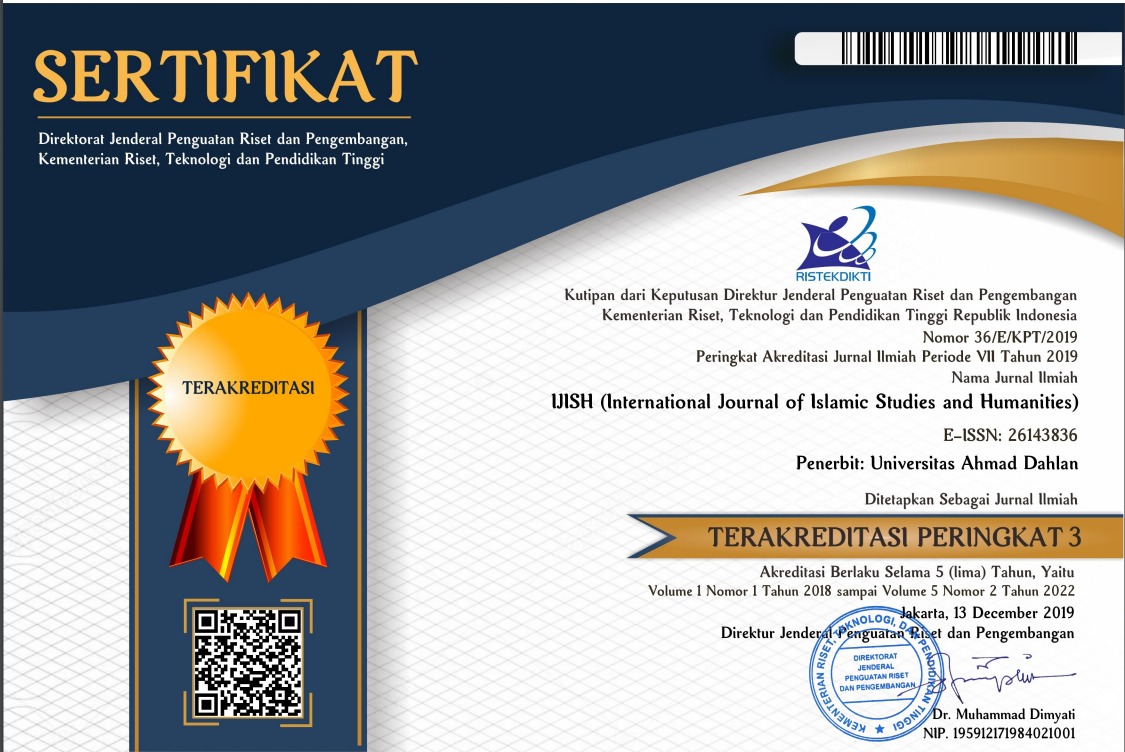Historiography of Indonesian Islam (Historical Analysis of the Transitional Era of Social and Political System in Java in the 15-16th Century and the Contribution of Javanese Kings in Islamization)
DOI:
https://doi.org/10.26555/ijish.v1i1.129Keywords:
Historiography, Indonesian Islam, Imam-mollah, Trade, Politic,Abstract
This writing explained about the social, economic, and political background around the local leaders which happened when there was political power change in harbors of Java north seashores throughout the 15th century. This explanation could make clear about the process of Islamic settle through the politic power shift from Hindu-Budha to Muslim leaders in Java north seashores to be something which was plausible. The above description has ignored the social, economic, and political contexts in the societies, where the king lives and leads. This description also assumed that it was not important about the marriage relationship among Muslim sellers with princesses and between infidel leaders with Muslim leaders’ daughter in other places. A special discussion should be made to make the religious and political change to be more made sense. The way was by looking at the religious change of the area leaders as the last process of Islamic political era. The roles of imam-mollah enabled them to have practical politic activity and have high position in the activity that was as king’s adviser. The role of imam-mollah as king’s adviser was seen as the arousing of big position and role of the Brahmin and social politic system of Hindu-Budha in Indonesia. The roles of imam-mollah in the golden era of Java north seashore compared with the Brahmin also needed special review. At the beginning of Muslim sellers came to Indonesia had relationship between the activities of trade, politic, and religion. The Muslim sellers had mutualism and volunteer trade relationship with the infidel leaders in north seashores. But, day by day, if a trade center got crowded and wealth, and the community and leaders there were Muslims, the surrounded leaders who want to have relationship with Muslim sellers in the trade center seemed to have psychology push to be Muslim.Downloads
Published
2018-04-07
How to Cite
Sunarso, A. (2018). Historiography of Indonesian Islam (Historical Analysis of the Transitional Era of Social and Political System in Java in the 15-16th Century and the Contribution of Javanese Kings in Islamization). IJISH (International Journal of Islamic Studies and Humanities), 1(1), 9–20. https://doi.org/10.26555/ijish.v1i1.129
Issue
Section
Articles
License
Authors who publish with IJISH (International Journal of Islamic Studies and Humanities) agree to the following terms:
- Authors retain copyright and grant the journal right of first publication with the work simultaneously licensed under a Creative Commons Attribution License (CC BY-SA 4.0) that allows others to share the work with an acknowledgment of the work's authorship and initial publication in this journal.Â
- Authors are able to enter into separate, additional contractual arrangements for the non-exclusive distribution of the journal's published version of the work (e.g., post it to an institutional repository or publish it in a book), with an acknowledgment of its initial publication in this journal.
- Authors are permitted and encouraged to post their work online (e.g., in institutional repositories or on their website) prior to and during the submission process, as it can lead to productive exchanges, as well as earlier and greater citation of published work.

This work is licensed under a Creative Commons Attribution-ShareAlike 4.0 International License.






